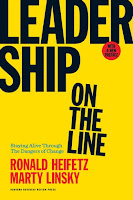In a clergy discussion last month one of my colleagues mentioned that she had just read
this book and recommended it as a good read. While the Zoom meeting was still going on I had purchased it.
IT was a good recommendation. In a world where many of our churches are struggling with decline and trying to figure out a way forward this book offers a different answer. Too often the answer we jump to is "maybe if we tried..." or "this new program will...." or "if we worked harder at...". Instead this book suggests we pause and wait and listen so we can encounter the God who is acting in the world.
It is hard advice in a world where we feel like we have to do something to stave off decline and death. Then again, the way we have been responding have not really worked out the way we hoped so maybe trying a different tack has some merit.
There were suggestions in this book that resonated with things I already thought needed to happen, things I was trying to bring in. I do still struggle with how to convince churches who want to "do" to get out of decline to pause to "be" and wait and listen. In some ways it goes against all common sense. In many ways it is the reverse of what seems needed, sometimes doing somethings out of our anxiety is the only way we can cope. Then I am drawn to the example the authors use of the Acts 1 church who are told to wait for God to act but end up trying to act themselves while they wait -- only for God to go God's own way as the book continues.
As with most books on this topic it is useless if only the clergy reads it. I encourage all church leaders, clergy and lay, to read and discuss it. With that in mind, I will be suggesting it to our local council.

.jpg)







